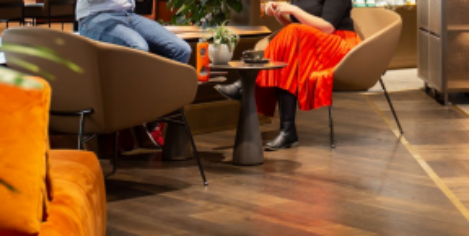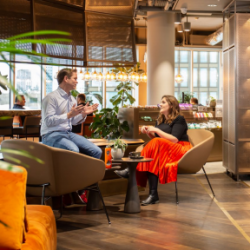To provide the best experiences, we use technologies like cookies to store and/or access device information. Consenting to these technologies will allow us to process data such as browsing behaviour or unique IDs on this site. Not consenting or withdrawing consent, may adversely affect certain features and functions.
The technical storage or access is strictly necessary for the legitimate purpose of enabling the use of a specific service explicitly requested by the subscriber or user, or for the sole purpose of carrying out the transmission of a communication over an electronic communications network.
The technical storage or access is necessary for the legitimate purpose of storing preferences that are not requested by the subscriber or user.
The technical storage or access that is used exclusively for statistical purposes.
The technical storage or access that is used exclusively for anonymous statistical purposes. Without a subpoena, voluntary compliance on the part of your Internet Service Provider, or additional records from a third party, information stored or retrieved for this purpose alone cannot usually be used to identify you.
The technical storage or access is required to create user profiles to send advertising, or to track the user on a website or across several websites for similar marketing purposes.
 A new study by Zurich UK, claims employers who embrace the flexible working revolution post Covid-19 could boost applications for senior positions from women by 20 percent. The data, which is part of a wider study carried out by the government-backed Behavioural Insights Team, claims that applications from women for management roles surged by a fifth after it promoted its own flexible working hours. (more…)
A new study by Zurich UK, claims employers who embrace the flexible working revolution post Covid-19 could boost applications for senior positions from women by 20 percent. The data, which is part of a wider study carried out by the government-backed Behavioural Insights Team, claims that applications from women for management roles surged by a fifth after it promoted its own flexible working hours. (more…)








 The physician can bury his mistakes,—but the architect can only advise his client to plant vines. Frank Lloyd Wright’s eternal epigram is not just true for buildings. It also applies to the authors of books, especially those on the subjects most affected by this year’s pandemic. Speakers and blog writers can quietly inter the things they get wrong, while the book sits unchangeable on a shelf. Maybe behind a houseplant.
The physician can bury his mistakes,—but the architect can only advise his client to plant vines. Frank Lloyd Wright’s eternal epigram is not just true for buildings. It also applies to the authors of books, especially those on the subjects most affected by this year’s pandemic. Speakers and blog writers can quietly inter the things they get wrong, while the book sits unchangeable on a shelf. Maybe behind a houseplant.






 New research published by
New research published by 


 The vast majority of UK office workers neither want to continue working remotely after Covid-19 restrictions lift nor make a full return to the 9 to 5. This is despite the fact that many admit that remote work has reduced their productivity. Those are the main claims of new research released by
The vast majority of UK office workers neither want to continue working remotely after Covid-19 restrictions lift nor make a full return to the 9 to 5. This is despite the fact that many admit that remote work has reduced their productivity. Those are the main claims of new research released by 




 A third of flexible workspace providers reported that occupancy rates have remained relatively stable through the global lockdown, only falling by 10 percent. On average, operators reported demand for flex space at 52 percent of pre-Covid levels, but some suburban markets have seen significant growth and pricing in those areas has increased.
A third of flexible workspace providers reported that occupancy rates have remained relatively stable through the global lockdown, only falling by 10 percent. On average, operators reported demand for flex space at 52 percent of pre-Covid levels, but some suburban markets have seen significant growth and pricing in those areas has increased. 








November 11, 2020
Burnout, stress and disconnection are now our most urgent workplace mental health issues
by Catherine Flynn • Comment, Flexible working, Wellbeing